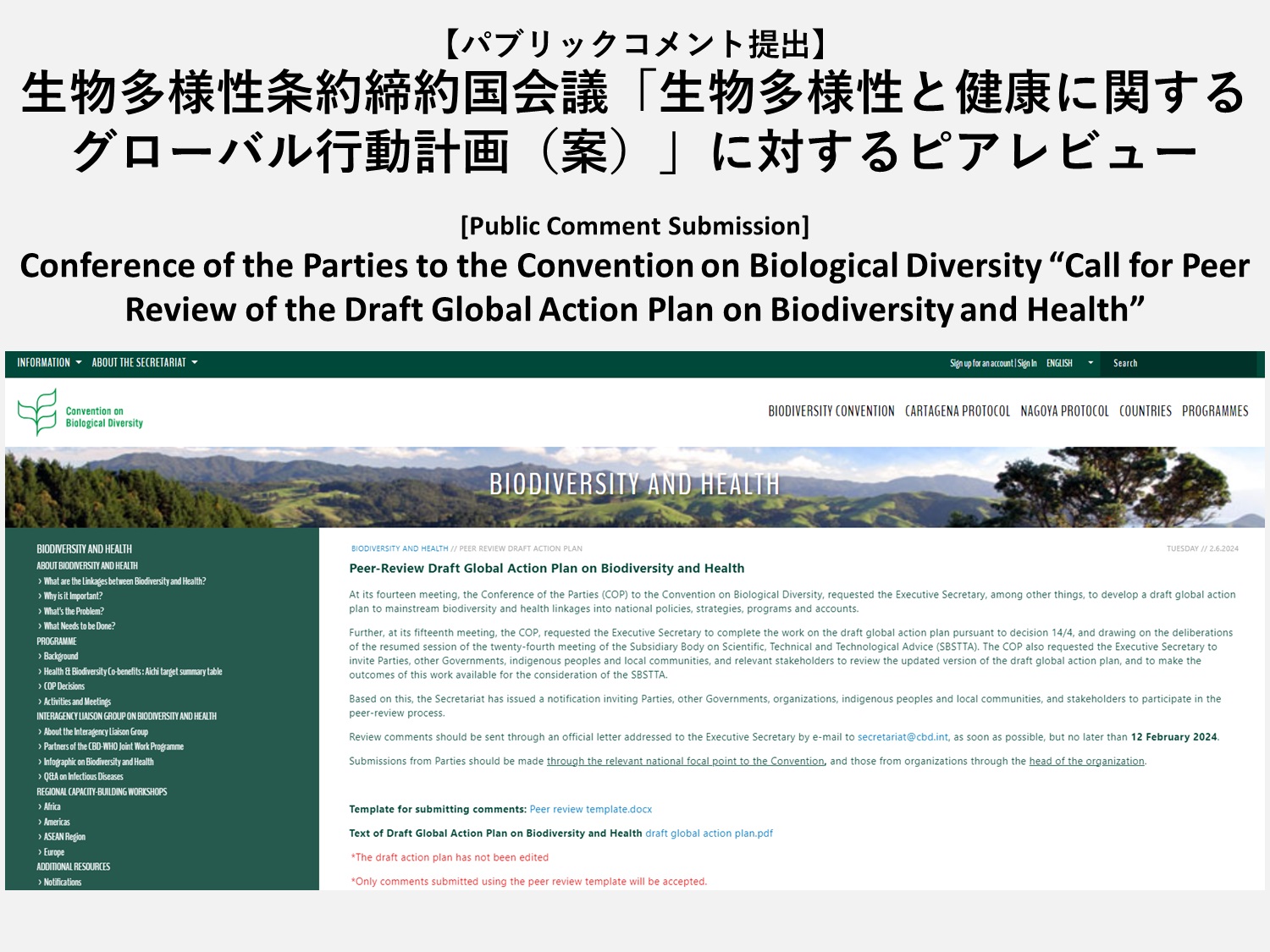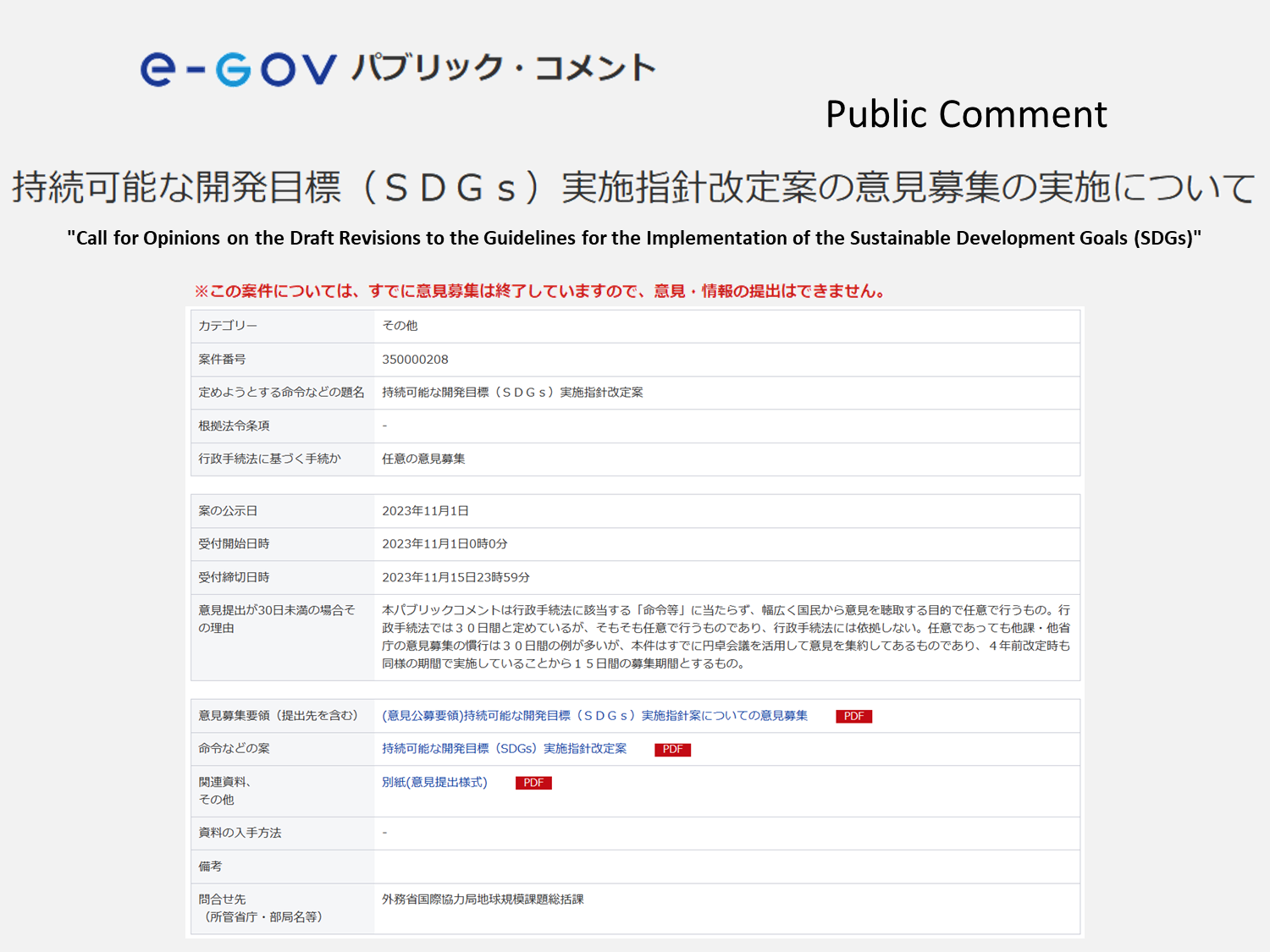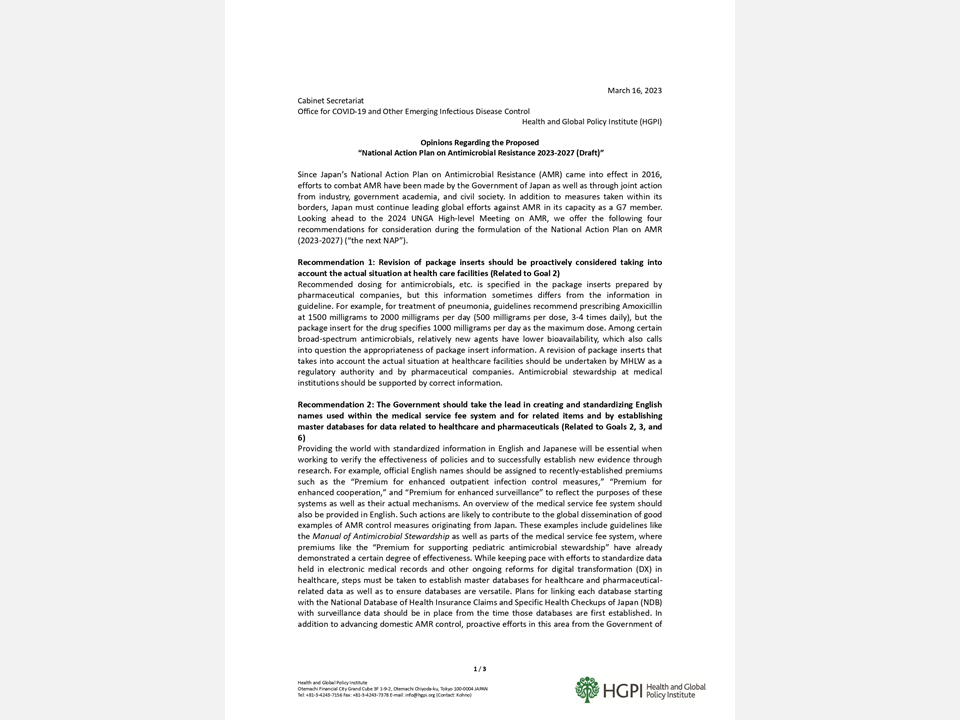[Public Comment Submission] “The Basic Policy for Environmental Conservation Activities, Encouragement of Willingness for Environmental Conservation, Environmental Education, and Promotion of Collaborative Efforts” (March 1, 2024)
date : 3/8/2024
Tags: AMR, Planetary Health
![[Public Comment Submission] “The Basic Policy for Environmental Conservation Activities, Encouragement of Willingness for Environmental Conservation, Environmental Education, and Promotion of Collaborative Efforts” (March 1, 2024)](https://hgpi.org/en/wp-content/uploads/sites/2/HGPI_240301_ENVeyecatch.jpg)
Health and Global Policy Institute’s Planetary Health Team and Antimicrobial Resistance (AMR) Team submitted their written opinion on the draft of “The Basic Policy for Environmental Conservation Activities, Encouragement of Willingness for Environmental Conservation, Environmental Education, and Promotion of Collaborative Efforts” by the General Policy Division of the Minister’s Secretariat within the Ministry of the Environment. (The call for public comments is now closed.)
Advancing environmental conservation activities contribute to developing a sustainable society, and it is important to encourage willingness for activities through efforts such as environmental education. Mutual collaboration between citizens, corporations, private bodies, and the State as well as local governments is also meaningful in environmental conservation. In June 2011, “The Law for Enhancing Motivation on Environmental Conservation and Promoting of Environmental Education” (“the Law”) was announced, which aimed to further promote environmental conservation activities and environmental education.
In June 2012, the Cabinet decided “The Basic Policy for Environmental Conservation Activities, Encouragement of Willingness for Environmental Conservation, Environmental Education, and Promotion of Collaborative Efforts” (“the Basic Policy”) based on the Law., The Basic Policy is to be reviewed roughly every five years and amendment is under consideration.
The public comment includes the following perspectives:
- Regarding environmental conservation and environmental education including in higher education and jobs, it is essential to consider viewpoints on linkage between humans, animals and the ecosystem, namely “planetary health”, which includes the “One-Health Approach”.
- The global crisis of climate change, biodiversity loss, and pollution interacts with economic and social challenges and adversely affects the health of humans and animals by an increase of emerging/re-emerging infectious diseases, particularly AMR, zoonotic diseases spillover such as bird influenza and febrile illness mediated by ticks and mosquitoes.
- The Programme for International Student Assessment (PISA) for 15-year-old students, which is offered by the Organization of Economic Cooperation and Development (OECD), will contain questions about the interconnectedness between humans and the ecosystem in the next 2025 version and should be utilized in environmental education.
- Universities, graduate schools, and research institutions have the core function of linking industry, government, academia, and citizens and should promote decarbonization of themselves and interdisciplinary education and research.
- The State and local Governments should lead by example in environmental conservation activities, develop criteria to evaluate and praise advanced activities of corporations and private bodies and build awareness among investors and shareholders as well as citizens.
For more information on this public comment, please click here. (only available in Japanese)
Top Research & Recommendations Posts
- [Research Report] Perceptions, Knowledge, Actions and Perspectives of Healthcare Organizations in Japan in Relation to Climate Change and Health: A Cross-Sectional Study (November 13, 2025)
- [Policy Recommendations] Mental Health Project: Recommendations on Three Issues in the Area of Mental Health (July 4, 2025)
- [Research Report] The 2025 Public Opinion Survey on Healthcare in Japan (March 17, 2025)
- [Policy Recommendations] Developing a National Health and Climate Strategy for Japan (June 26, 2024)
- [Research Report] The 2023 Public Opinion Survey on Satisfaction in Healthcare in Japan and Healthcare Applications of Generative AI (January 11, 2024)
- [Policy Recommendations] Recommendations on Strategic Investments in Policies for Brain Health to Revitalize Japan: Hopes for the New Administration (December 1, 2025)
- [Policy Recommendations] Reshaping Japan’s Immunization Policy for Life Course Coverage and Vaccine Equity: Challenges and Prospects for an Era of Prevention and Health Promotion (April 25, 2025)
- [Announcement] HGPI Endorses the “Belém Health Action Plan” (November 14, 2025)
- [Announcement] HGPI Joins Global Green and Healthy Hospitals (August 1, 2023)
- [Research Report] AMR Policy Update #2: WHO’s First Report on Fungal Infection—Bridging the Gap Between Clinical Practice and R&D
Featured Posts
-
2025-12-09
[Event Report] Special Seminar “Rising to New Challenges in Health Sciences for Future Society: Novel Developments in the Field of Epilepsy in Japan and Globally” Belgium Pavilion Special Seminar, World Expo 2025 Osaka, Kansai (September 18, 2025)
![[Event Report] Special Seminar “Rising to New Challenges in Health Sciences for Future Society: Novel Developments in the Field of Epilepsy in Japan and Globally” Belgium Pavilion Special Seminar, World Expo 2025 Osaka, Kansai (September 18, 2025)](https://hgpi.org/en/wp-content/uploads/sites/2/HGPI_20250805_mental-health-expo-eyechatch.png)
-
2025-12-11
[Event Report] Core Components of Universal Health Coverage (UHC): Achieving “Healthcare Without Financial Hardship” in Asia-Pacific and Japan (December 5, 2025)
![[Event Report] Core Components of Universal Health Coverage (UHC): Achieving “Healthcare Without Financial Hardship” in Asia-Pacific and Japan (December 5, 2025)](https://hgpi.org/en/wp-content/uploads/sites/2/HGPI_20251210_Core-Components-of-Universal-Health-CoverageUHC-top.jpg)
-
2025-12-12
[Registration Open] Meaningful Involvement Promotion Project Urgent Symposium “The New Takaichi Administration and Central Social Insurance Medical Council Reform – Ensuring Patients’ Voices are Heard” (January 22, 2026)
![[Registration Open] Meaningful Involvement Promotion Project Urgent Symposium “The New Takaichi Administration and Central Social Insurance Medical Council Reform – Ensuring Patients’ Voices are Heard” (January 22, 2026)](https://hgpi.org/en/wp-content/uploads/sites/2/HGPI_20251208_urgent-symposium-1.png)
-
2025-12-12
[Registration Open] (Webinar) The 140th HGPI Seminar “Early Detection to Reduce COPD Disease Burden: Connecting Clinical Frontiers with Health Policy” (January 27, 2026)
![[Registration Open] (Webinar) The 140th HGPI Seminar “Early Detection to Reduce COPD Disease Burden: Connecting Clinical Frontiers with Health Policy” (January 27, 2026)](https://hgpi.org/en/wp-content/uploads/sites/2/hs140-top.png)
-
2025-12-16
[Discussion Points] Policy Dialogue “Considering Comprehensive Genomic Profiling from the Perspective of Patient Access: Utilizing the Medical Service Fee Reimbursement System and the Mixed Medical Services Program to Meet the Needs of Today” (November 28, 2025)
![[Discussion Points] Policy Dialogue “Considering Comprehensive Genomic Profiling from the Perspective of Patient Access: Utilizing the Medical Service Fee Reimbursement System and the Mixed Medical Services Program to Meet the Needs of Today” (November 28, 2025)](https://hgpi.org/en/wp-content/uploads/sites/2/eyecatch_Policy-Dialogue_Discussion-Points_20251128.jpg)







